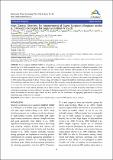High genetic diversity for improvement of sweet sorghum (Sorghum bicolor (L.) Moench) genotypes for sugar and allied products

View/
Publication Date
2014-05-30Author
C Olweny, J Jamoza, MM Dida, W Kimani, J Njuguna, D Githae, B Kiawa, N Yao, L Kosambo, C Sally, P Okori
Metadata
Show full item recordAbstract/
Sweet sorghum (Sorghum bicolor (L.) Moench) is a cultivated sorghum recognized as potential alternative source of bio-fuel due to its high fermentable sugar content in the stalk. It provides renewable energy products, industrial commodities, food and animal feed. Sweet sorghum gene pool creation has not received much attention mainly because it was not considered to be among important crops in Kenya, and the pedigree information is scarce and incomplete. The objective of the study was to assess the genetic diversity and relationship among a collection of sweet sorghum genotypes using SSR markers. Eighty six sweet sorghum cultivars from Argentina, Brazil, Kenya (ICRISAT and Moi University), United States of America and Zambia were genotyped with 11 SSR markers that generated 86 alleles with an average of 8 alleles per locus. Polymorphism information content (PIC) value was 0.53 indicating a moderate diversity with a range of 0.09~0.89. The variability among the populations was low as 3% but amounted to 22% and 75% within individual genotypes and among individuals respectively. Clustering analysis based on the genetic similarity (GS) grouped the 86 sweet sorghum genotypes into 2 distinct clusters. The study also revealed the genetic relationship of cultivars with unknown parentage to those with known parentage. Information generated from this study can be exploited to select parents for hybrid development to maximize sugar content and total biomass and for development of segregating populations to map genes controlling sugar content in sweet sorghum.
